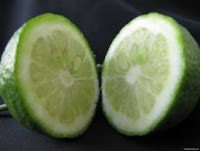The soursop fruit has perhaps been a victim of its name in English, as it was mooted by Nestle the food giant way back in 1964 that it could be one of the South American fruits along with the passion fruit and guava to make it big in the European market. The other two have since become accepted in Europe , but the soursop needed the boost that one study seemingly gave it when it was reported that fruit or leaf extracts could kill cancer cells in the lab. This study has not been supported by other research.
Apparently Europeans can’t get their tongues around the Spanish word for the fruit, guanábana, but the Portuguese word is easier to pronounce, graviola, so perhaps it will lose its sour name in favour of this one. It is said to taste a little like its relative, the custard-apple (Annona squamosa reticula) or shareefa in Urdu, and rather like a cross between a strawberry and a pineapple with a banana-like texture, or possibly like coconut flesh.
 Unlike the other fruit in its genus the soursop (the largest of it genus) can be preserved and used for ice-creams, sorbets and juice. Soursop is a popular drink in the countries where it grows, although a study in the
Unlike the other fruit in its genus the soursop (the largest of it genus) can be preserved and used for ice-creams, sorbets and juice. Soursop is a popular drink in the countries where it grows, although a study in the  Soursop can grow large like the jackfruit and durian. Unlike the custard apple it is spiny giving rise to the Malay name for the fruit “mullaatha” meaning just that, thorny custard apple. Hindu legend has it that Lord Ram and Hanuman (the monkey god) consumed soursops on their way to
Soursop can grow large like the jackfruit and durian. Unlike the custard apple it is spiny giving rise to the Malay name for the fruit “mullaatha” meaning just that, thorny custard apple. Hindu legend has it that Lord Ram and Hanuman (the monkey god) consumed soursops on their way to In traditional medicine systems all pats of the tree and fruit are used, although you should discard the seeds if you eat the raw fruit as they are indigestible. A tisane made from the leaves, bark and roots of the tree is given to relieve stress and anxiety as well as to lift depression, balance blood sugar levels and to lower high blood pressure. The juice from the fruit is said to get rid of internal parasites and increase the milk flow in lactating mothers. The tisane and the fruit are not recommended for use during pregnancy however as they stimulate the uterus.
A decoction of the seeds is used to get rid of head lice, and the pulverized unripe fruit has astringent properties so is useful in a decoction to treat diarrhoea and dysentery. The roots are also used to get rid of intestinal worms, and the root bark is said to be an antidote to poisoning. The flowers are used in an infusion or decoction for catarrhal problems. The mashed leaves can be made into a poultice to alleviate eczema and other skin problems, and to relive the pains of rheumatism. The sap from the young leaves is used on skin eruptions such as acne and pimples. The chewed leaves mixed with saliva are put on incisions made during surgery in the belief that this will prevent the formation of scar tissue. A decoction of the leaves can be used as a foot bath for swollen feet as well as applied to painful rheumatic joints.
 The ripe fruit has diuretic qualities and it is thought in some countries that if eaten during fasting it will help relieve leprosy and liver problems such as hepatitis. In the
The ripe fruit has diuretic qualities and it is thought in some countries that if eaten during fasting it will help relieve leprosy and liver problems such as hepatitis. In the  A decoction of the young leaves is used for gall bladder problems and coughs and catarrh. The seed oil as well as the decoction mentioned above is also said to get rid of head lice. The flesh of an unripe acidic soursop (they come in three categories, sweet, semi- acidic and acidic) when pulverized can be made into a poultice which has to be left on unchanged for three days to heal wounds and ulcers.
A decoction of the young leaves is used for gall bladder problems and coughs and catarrh. The seed oil as well as the decoction mentioned above is also said to get rid of head lice. The flesh of an unripe acidic soursop (they come in three categories, sweet, semi- acidic and acidic) when pulverized can be made into a poultice which has to be left on unchanged for three days to heal wounds and ulcers. It is also said that if the leaves are steeped in water with a little fresh lime juice and a drunk person washes his or her head in it and drinks a little of that water, they will become sober very quickly.
 There have been few studies done on soursop but it appears that the extracts have antiviral effects against the Herpes virus, really do have an adverse effect on intestinal worms and parasites, are anti-rheumatic, astringent and emetic. Whether or not they kill cancerous cells has yet to be tested on humans; and eaten in excess the fruit may damage the cognitive functions of the brain.
There have been few studies done on soursop but it appears that the extracts have antiviral effects against the Herpes virus, really do have an adverse effect on intestinal worms and parasites, are anti-rheumatic, astringent and emetic. Whether or not they kill cancerous cells has yet to be tested on humans; and eaten in excess the fruit may damage the cognitive functions of the brain.

















































